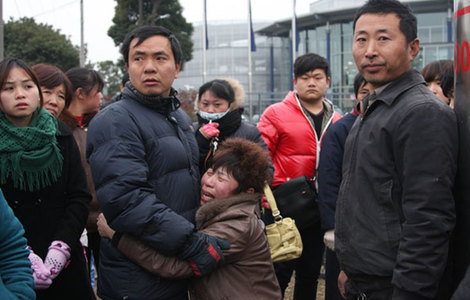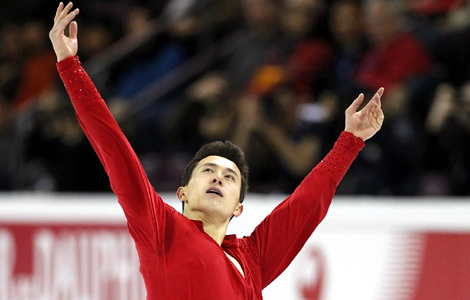Village embraces democracy with procedure details
Updated: 2012-02-13 10:04
(Xinhua)
|
|||||||||||
GUANGZHOU - Yang Semao put on a navy-blue suit on early Saturday morning, a rare dressing habit for the fishermen in the village of Wukan in south China's Guangdong Province.
"Election is something solemn and I must dress formally," Yang said before he went to the village school where an election would be held.
Yang is the director of the election committee, who hosts the voting that involves more than 6,000 villagers in Wukan, which is put under global spotlight for last year's massive protests against village authorities over illegal land use and other issues.
Saturday's voting, the second round after villagers elected an 11-member election committee on February 1, is supposed to result in a team of 107 village representatives and seven group leaders.
Finally, 109 village representatives are elected as two groups each has two candidates with equal number of votes.
But the voting fails to elect seven group leaders as all the candidates fail to secure half of each group's votes as required. Another election will be held later to fill the vacancy.
Yang says the votes surpass 80 percent of the total 7,923 villagers who are entitled to vote and the election results are therefore valid.
"The voting process was smooth and orderly," says Lin Zulian, secretary of the Communist Party of China (CPC) Wukan village branch. "The villagers took an active part in the voting, and they are more familiar with the procedures compared with the previous round of voting for election committee members on February 1."
Villagers are attentive to procedure details as they are experimenting with the democratic election, which they gain through their endeavors.
In September last year, Wukan villagers began to protest against village leaders over issues related to land use, financing and the election of village officials.
The villagers walked onto streets in large scale later that year to protest authorities for about a week.
Guangdong provincial government finally conceded that the villagers' major demands were reasonable and "some mistakes" had been made by local officials.
The government also announced that last February's election of the former village leaders was invalid and new elections were to be organized.
Yang says Saturday's election, based on the first round early this month, is better organized and more transparent and fairer as many procedure details have been observed such as in ballot hand-out and statistics and order maintaining.
While Yang is announcing the ballot casting is ending late Saturday, late-coming villager Zou Junqiang, 47, is trying to insert his last ballot into the box.
Zou is stopped by a voting monitor, who has to decide with four other monitors if the last ballot is valid. After a brief voting among the five, the ballot is announced valid with three pros.
"We are all in favor of democracy," Yang says. "We try to do the best in every aspects of the election and let every details be fully discussed and implemented."
Wukan villagers are more concerned about the procedure of democracy, through which they hope their interests will be better safeguarded.
And their pursuit on rightful procedure is encouraged by a speech delivered by Premier Wen Jiabao during his inspection in Guangdong a week ago.
On a visit to the village of Shuili in Guangzhou, capital city of Guangdong, Wen highlighted the need to ensure farmers' voting rights and the direct election of village-level leadership.
Wen said self-governess is the only appropriate way for improving rural community administration, and local affairs should be decided by local villagers.
There should be a strict legal system and regulations for the election, as well as election procedures that are open, fair and transparent, he said.
Wen's speech is posted in the Wukan village during the election, and some parts of the speech are underscored.
Villager Zhang Jianxing says he is not very familiar with all the procedures, but he agrees with what the premier says.
"Under the premise of Wukan's reality and conditions, we improved the voting procedure to make the election rightful, impartial and open," Zhang writes in his blog.
However, it is not always easy to maintain fairness and rightfulness in the election and win support and understanding of all villagers, party secretary Lin says.
A villager who tries to cast ballots for his wife and children is stopped in Saturday's voting.
According to the election committee, a villager is not allowed to cast ballots for others unless he or she gets their written letters of authorization.
"They are my wife, son and daughter. Why cann't I vote for them since you know all of us?" the disgruntled villager questions.
Yang comes up to explain and stands on the side of the election workers. "Rules are rules. They shouldn't be broken," Yang says.
Some election observers say Wukan's pursuit on democratic election as well as the rightful procedure is of great significance in China's rural community construction.
Wukan's situation is typical in China as some local governments are prone to infringing on villagers' interests by selling their farmland to developers at low prices, which will lead to conflict between villagers and officials, said Guo Weiqing, a politics and public affairs professor at the Guangzhou-based Sun Yat-Sen University.
"It is necessary to draw lessons from the Wukan experience for other local governments in China," Guo said. "Chinese villagers are completely capable of promoting and maintaining democracy and self-governance at village levels."
For Wukan villagers, their major concern remains the land issue.
"I hope the deputies who eventually stand out will all be capable people of integrity," says Huang Deping, a villager in his 50s. "Election is not the ultimate end. I hope they will safeguard our rights and interests and help us manage our land well."
- US town ready to welcome return of special guest
- State firms need private investment
- EU 'will solve its debt crisis'
- China aims to lure foreign experts
- Envoy: VP visit will boost Sino-US relations
- ROK ship detained over toxic spill
- China to loan two pandas to Canada
- US pop queen Whitney Houston dies
Hot Topics
Kim Jong-il, Mengniu, train crash probe, Vaclav Havel, New Year, coast guard death, Internet security, Mekong River, Strait of Hormuz, economic work conference
Editor's Picks

|

|

|

|

|

|







